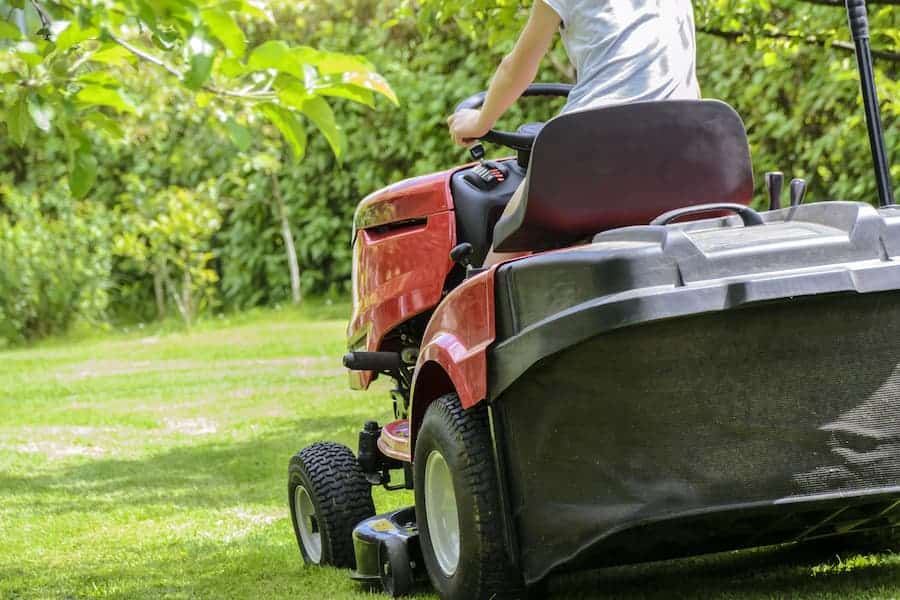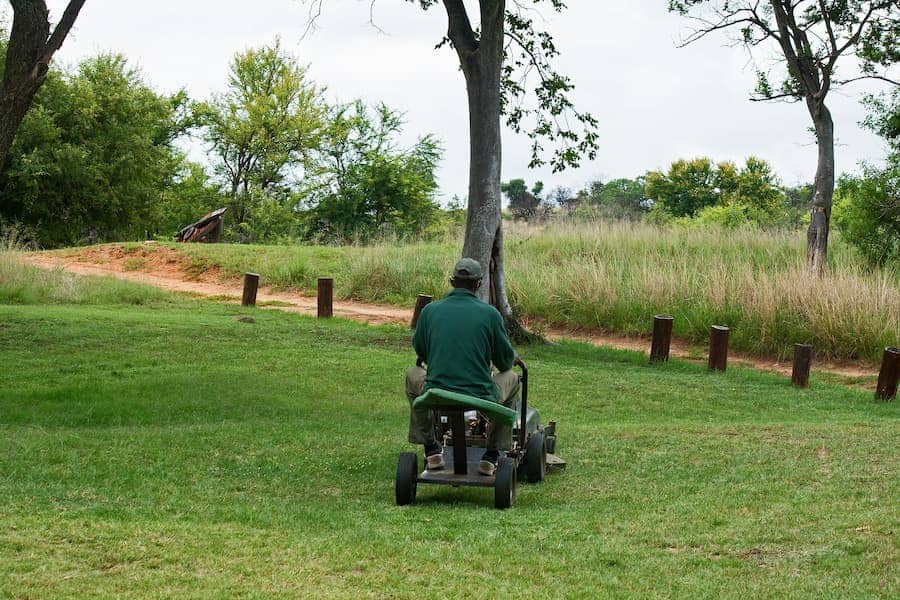Riding lawn mowers can vary significantly in weight, which affects their performance, maintenance, and longevity. Learn about the factors that affect riding lawn mower weight and why it matters.
How Much Does a Riding Lawn Mower Weigh?
Factors That Affect Riding Lawn Mower Weight
There are multiple factors that affect how heavy a given riding lawn mower is. They include; the make and model of the mower, how big its fuel tank is and the contents of that fuel tank, the material of the mower deck, and what attachments have been added to the mower.
Make and Model

The smallest and lightest-weight riding lawn mowers weigh in at about 340 pounds. Larger models can weigh as much as 640 pounds. With many different materials, features, and builds, there is a wide range of weights between one riding mower model and another. Specialty riding mowers designed for cutting thick grass can weigh even a bit more.
On the other hand, zero-turn riding mowers are a highly-efficient way to get a perfectly manicured lawn, but they’re much, much heavier. A zero-turn mower has added technology and components that increase the weight while allowing it to turn around without straying from its own footprint.
Mower Deck Material
Riding mowers are usually made from one of three materials: aluminum, steel, or plastic.
- Aluminum is both lightweight and extremely durable.
- Steel is much heavier than either plastic or aluminum, making these kinds of mowers the sturdiest.
- Plastic-decked riding mowers are the lightest.
Fuel
When calculating the weight of a riding lawn mower, you have to consider the weight of the fuel as well. Gasoline weighs about 6.3 pounds per gallon.
The size of the fuel tank varies between mower models, ranging from one to three gallons. So, a full tank of gas could add nearly 20 pounds of weight to your mower.
If you’re concerned about the weight of gas, take a look at our corded electric lawn mower reviews.
Add-Ons
Riding lawn mowers can do more than just cut grass. There are a variety of accessories that can be paired with a riding lawn mower to accomplish more complicated landscape and gardening tasks.
When calculating the weight of a riding lawn mower, such as when you are planning to tow it on a trailer, it’s important to include the weight of any accessories. Here are some common riding lawn mower add-ons and their approximate weights:
Grass Catcher
These fabric or mesh bags collect grass clippings automatically as you mow. The bags themselves aren’t very heavy, but the arm that connects them to the mower can weigh up to 25 pounds.
Lawn Sweeper
Towed behind your riding mower, the best lawn sweep will pick up leftover cut grass, mulch, leaves, and other debris in your yard. They are not very heavy, but they do add bulk and weight.
Mulching Kit
Mulch is a nutritious mixture of broken-down plant matter that feeds grass and helps it grow. With a mulching kit, your lawnmower will turn grass clippings into mulch as you cut. Not only that, the mulch is then redistributed onto your lawn as you mow.

The standard mower blade must be removed from the lawnmower, and a mulching blade is installed in its place. Although you add some hardware when installing the mulching blade for thick grass, the total weight of the lawnmower won’t change very much.
Mulch has been shown to help produce a greener lawn over time.
Cultivation Tools
Tillers and other cultivating tools prepare the ground for planting. When used in conjunction with a riding mower, they essentially turn your lawnmower into a garden tractor. Expect cultivation tools, including tillers, to add between 30 and 60 pounds to the weight of your tractor.
Does Riding Lawn Mower Weight Matter?
Lawnmower weight matters when you’re planning to tow or haul your riding mower. The towing capacity of a vehicle tells you how much weight it can safely drag along behind it. When you exceed your vehicle’s tow capacity, you may have difficulty maneuvering.
Worse, if the load is too heavy it can affect your ability to stop the car. To be sure you are not exceeding your car’s tow capacity, you must calculate the total weight of the entire load. This includes:
- The riding mower
- Any fuel it is carrying
- The weight of any attachments
- Grass clippings, if present
- The trailer itself
When preparing to tow a riding mower, look for a vehicle with a towing capacity of at least 2,000 pounds.
Conclusion
Traditional riding mowers weigh between 300 and 700 pounds, while heavier zero-turn models can weight between 600 and 1,200 pounds. Accurately calculating the weight of your lawnmower is important when preparing to tow it to another location. The weight of an individual riding mower is determined by its make and model, fuel storage, construction materials, and add-ons.